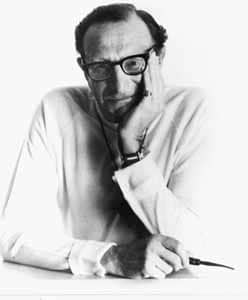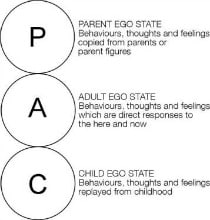Transactional Analysis Basic Concepts
Transactional analysis is a type of psychotherapy developed by Canadian psychiatrist Eric Berne in the 1940s.
Berne believed that communication with others comes from three distinct parts of self which he called ego states.
The ego states are:
- Parent
- Adult
- Child

Berne wanted to develop a therapy which was easier for the general public to understand.
Using ‘layman’s terms’, he went on to write a number of influential books. One of these books is ‘The Games People Play’ which is still popular today, 25 years after it was first published.
The theory of TA is (on the surface) is quite simple: Berne believed that people have difficulty in their lives due to how they communicate and interact with others.
He believed that human beings have three distinct attitudes or states of mind which he called ego states.
The 3 Ego States
- Parent (behaving in ways which we learn and react out our parent’s behaviour as adults)
- Adult (using logic and evidence to guide our behaviour, not becoming emotional)
- Child (replaying childish behaviours as adults)
The goal of TA is to help clients strengthen their Adult Ego State and enhance their communications with other people.

The Key Concepts and Principles of Transactional Analysis
- Transference and Counter-transference. How memories from past relationships can impact on your current relationships.
- Phenomenology. How our individual perception can impact on how we conduct relationships (this idea is also the basis of Gestalt & PCT
- Ego States -Structural and Functional Models in TA.
Structural – The basic idea of ego states
Functional – How the theory of ego states is applied
- Life Scripts. How messages we receive as children help us build a view of ourselves and others which through therapy we can change.
- Games. How a series of interactions between two or more people follow predicable patterns and outcomes.
- Racket feelings. Feelings that the child learns are acceptable and/or desired, which are used to replace the real feelings which a parent may find unacceptable.
Clients are encouraged to undertake homework to assess how the therapy is working for them.
The therapist analyses your past and how it affects the here and now, which is why it is known as an Active Directive form of therapy.
TA therapists believe that past life events (things that happened maybe in childhood) hold the key to understanding what our present difficulties are. This is known in TA therapy as the presenting past.
Free Handout Download
Structural and Functional Models of Ego States
Types of Transactional Analysis
Since the death of Eric Berne in 1970, Transactional Analysis has developed along differing theoretical paths, sometimes referred to as 'Schools'.
- The Classical School - sometimes referred to as transactional analysis proper, includes ego state analysis, life scripts and game analysis, is the original concept based on the work of Eric Berne, Claude Steiner and several close associates.
- The Redecision School - developed by Bob and Mary Goulding who integrated TA with Gestalt to make a powerful, vibrant means of personal change.
- The Cathexis School - developed initially by Jacquie Schiff who worked with clients who had been diagnosed with severe mental health problems. Her approach was very controversial and was based on the theory of radical reparenting.
Modern Schools of TA are referred to as 'second wave' and have significantly influenced TA practice in recent years. Practitioners combine these new ideas with the Classical School to produce a contemporary, research-based approach to client work.
- Relational school - outlined by Charlotte Sills and Helena Hargaden in their book “Transactional Analysis a Relational Perspective”. This school draws strongly on the humanistic idea that the therapeutic relationship and empathy are central to the healing process.
- Integrative psychotherapy - developed by Richard Erskin. Like the relational school, this approach emphasises the empathic nature of the relationship in helping clients regain the parts of self, which become lost or fragmented due to traumatic experiences.